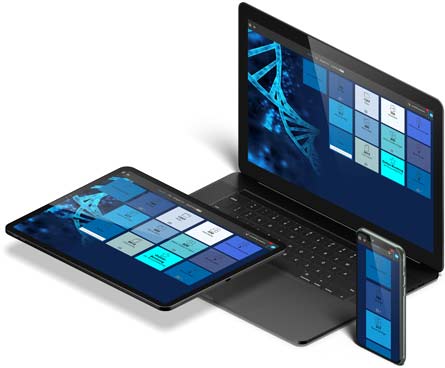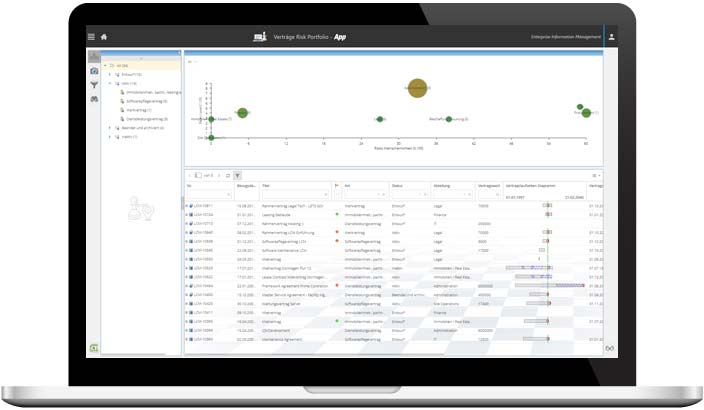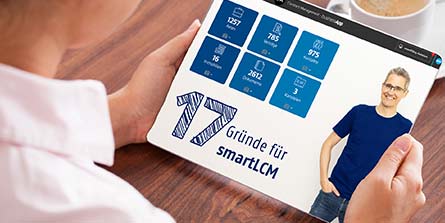Contract Management
What is the definition of contract management?
Contract management describes the administration of contracts. This includes the management of initial written negotiations, the actual contract with its terms and conditions, the documentation of amendments and archiving.In practice, contract management is seen as the basis for an organisation's business activities and therefore represents a corporate task that is as global as it is complex.

Contract Lifecycle Management
Contract processing, contract management and contract evaluation is part of the daily work of many departments and thus also part of the risk potential arising from contracts. As a rule, the legal, investment management, marketing, sales, purchasing, finance, controlling, auditing and information technology departments deal with contracts on a decentralized basis. The distributed knowledge as well as the decentralized responsibilities pose considerable risks for the company.
Many companies are unable to obtain an adequate overview of their internal and external contractual relationships at the push of a button in order to realistically assess the resulting risks. But third parties, such as banks, investors, or financial statement and auditors, are also pressing for a transparent overview of existing contractual relationships as part of their risk assessment and supervisory duties.
Successful and legally compliant management of these challenges requires concrete solution approaches with the objective of identifying and effectively controlling risks, optimizing processes, and achieving increases in efficiency and the necessary audit security in the area of compliance management.
Digitales versus analog Contract Management
Contract management can be analog, digital or a hybrid of both formats. Managing contracts in digital form speeds up, optimizes and automates the process considerably compared to analogue management and offers the following advantages: ACCESSIBILITY
The data can be easily viewed and edited from anywhere and at any time with the appropriate access rights.
PROCESSES
Standardization of processes enables implementation of more efficient workflows and minimization of human error.
COLLABORATIONS
Simplified collaboration between participants, as documents can be quickly shared, commented on and edited together.
REPORTING
Analysis and evaluation options are available at the touch of a button and support well-founded decisions.
EFFICIENCY
Contracts can be created, processed, checked and approved more quickly, saving time.
RESOURCE SAVINGS
The physical storage space for contract documents is reduced and the need for paper and other resources is minimized.
REVISION SECURITY
Changes to the data are traceable and thus the integrity of the contract is maintained.
DIGITAL SIGNATURE
Contracts can be signed digitally, which is simple, binding, legally secure and independent of location.
smartLCM Contract Management Software
Internal and decentralized decision-making levels require direct access to the company's global information while disclosing any risks. smartLCM Contract Management is a tool that automates the processes of contract management, contract conclusion and contract administration as well as parts of risk management.
smartLCM Contract Management and the other modular applications of the TQG businessApp cloud platform have developed into a knowledge database that manages and analyses structured and unstructured data for all organizational units in a company on a subject-specific basis, partly through intensive cooperation with users. This data, which is relevant both for transactions in the pipeline (NDAs, quotations, inquiries, RFIs, RFQs, etc.) and after the contract has been concluded (e.g. contract, attachments or supplier information), is managed, actively monitored and controlled in a way that complements a transaction-oriented system (such as SAP, Microsoft Dynamics NAV, etc.). Digital contract management ensures the highest compliance and audit standards!

Internal and decentralized decision-making levels require direct access to the company's global information with disclosure of any risks. With smartLCM contract management, a tool is available that automates the processes of contract creation, contract conclusion, contract management as well as sub-areas of risk management.
smartLCM contract management and the other modular applications of the TQG businessApp platform® have developed, among other things through intensive cooperation with users, into a knowledge database that manages and analyzes structured and unstructured data for all organizational units in a company on a subject-specific basis. This data, which is relevant both for deals in the making (NDA, offers, RFQs, RFI, RFQ, etc.) and after the contract has been signed (e.g. contract, attachments or supplier information), is managed, actively monitored and controlled as a complement to a transaction-oriented system (such as SAP, Navision, etc.). The contract management software ensures the highest compliance and audit standards!
- Compliance/audit security in the processes
- Process optimization in the organization > 30%
- Measurably transparent processes (inTime, InQuality, inBudget)
- Noticeably improved employee motivation
- 100% retrievable documents, contracts, files
- More efficient (automated) business processes
Future-proof contract management will secure your compliance and processes in the long term!
Digital contract management is ideally positioned for the future, can be optimally expanded in line with your compliance requirements and ensures your long-term business success. With smartLCM contract management, you too can benefit from one of the leading solutions. Web-based, technologically future-orientated and easy to use.
The need to use contract management and knowledge management to achieve transparency and commitment as well as conscious risk and compliance management has grown sustainably. The ever-increasing demands for agility and change are becoming a driver and show that the path of recent years was not sufficient. Knowledge is stagnating; more than 80% of documents and knowledge still exist in unstructured texts and files. IT alone has failed. The potentials are manifold and omnipresent. Wherever information needs to be stored, searched for and available for decisions. Storing and retrieving - was yesterday, today agile processes and workflows in companies must be structured with intelligent solutions, usually individually, for future requirements. Today, this is called Enterprise Information Management (EIM). The core competence here is "structured information and knowledge management" based on proven contract management. Along compliance and across departments.
The legal framework for contract management
The management and controlling of these contracts has been a company-critical compliance task not only since the German Corporate Sector Supervision and Transparency Act (KonTraG) came into force on May 1, 1998.
Contract management forms the foundation for a company's business activities and should therefore be part of a monitoring system (§§ 317 Para. 4 HGB in conjunction with 91 Para. 2 AktG).
The presentation of business risks is also required for the Group management report in accordance with Sections 289 (1) and 315 (1) HGB. The GmbH Act and Basel II also place demands on contract management. Key information on this can be obtained from well-documented contract management software, among other things.
Articles on Contract Management

17 reasons for smartLCM
Or why smartLCM is the right solution for you - here you will find an overview of the unique selling points of the TQG businessApp platform® and the smartLCM product. The comprehensive solution for contract management supports...

"NOVEM" - Nürnberger in the digital transformation
In order to remain attractive and competitive as one of Germany's major insurers and to continue to offer customers "Simply the Right Protection," Nürnberger regularly reviews all its work processes. One of these processes is the contract review process and its...

Future-proof contract management
The introduction of a contract and document management system (LCM) at Octapharma AG. The goal of the project was clearly defined from the outset: A single system was to be used for all essential contracts and important documents....

The electronic file in the global legal organization
What you store in the electronic file, you have everywhere. The positive experiences with electronic contract management have encouraged Henkel to develop an electronic alternative for file management as well. The integrative approach, further development of the LCM contract management software to include an eFile module, has been in use in Düsseldorf since April 2015.

Minimizing risks through the use of innovative IT systems
Standard software solutions that are used across departmental boundaries in the sense of a company-wide implementation are known as "Enterprise Information Management Systems" (EIM). The starting point is the definition of EIM, which includes the holistic management of all information in the company regardless of location, user, author, generating system, device and time.

Card Title example
This is an example of quick text to fill the body of the card with some content in order to present it properly in page. We hope you like it.
